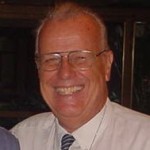Explore and find out a little bit more about the people behind the research article! We have profiled some of our authors so you can learn more about them, their work and check out their latest entries.
 The first of author is Brigida BOCHICCHO who is the assistant professor at the Department of Science, Università del la Basilicata, Potenza, Italy. Brigida‘s research interests are in the area of Protein-inspired (bio)materials.
The first of author is Brigida BOCHICCHO who is the assistant professor at the Department of Science, Università del la Basilicata, Potenza, Italy. Brigida‘s research interests are in the area of Protein-inspired (bio)materials.
Her NJC paper deals with the self-assembly behavior of some elastin-derived polypeptides rich in proline and proline-modified residues in order to investigate the role of proline in the self- assembly of elastin. This work constitutes the basis for the proper design of elastin-inspired drugs with tailored conformational properties.
If she could solve any scientific problem in any field, it would be: “The early recognition of Alzheimer disease onset in humans through chemical tools.” says Brigida.
Effect of proline analogues on the conformation of elastin peptides by Antonietta Pepe, Maria Antonietta Crudele and Brigida Bochicchio; New J. Chem., 2013,37, 1326-1335, DOI: 10.1039/C3NJ41001C; From themed collection Prolines.
 The next author who accepted to answer some questions for us was Samuel COUVE-BONNAIRE, assistant professor at the University of Rouen, France. His current research interests concern Organometallic chemistry, Fluorine chemistry, Asymmetric synthesis and Peptidomimetics. The article by Samuel and his co-authors looks into the new efficient asymmetric synthesis that has been developed to obtain the relevant fluorinated pseudodipeptide Ala-Ψ[(Z)CFCH]-Pro. Outside the laboratory, Samuel likes to spend time with his family and to play badminton (leisure and competition).
The next author who accepted to answer some questions for us was Samuel COUVE-BONNAIRE, assistant professor at the University of Rouen, France. His current research interests concern Organometallic chemistry, Fluorine chemistry, Asymmetric synthesis and Peptidomimetics. The article by Samuel and his co-authors looks into the new efficient asymmetric synthesis that has been developed to obtain the relevant fluorinated pseudodipeptide Ala-Ψ[(Z)CFCH]-Pro. Outside the laboratory, Samuel likes to spend time with his family and to play badminton (leisure and competition).
Straightforward asymmetric synthesis of Ala-Ψ[CFCH]-Pro, a proline-containing pseudodipeptide bearing a fluoroolefin as a peptide bond mimic by Guillaume Dutheuil, Camille Pierry, Emilie Villiers, Samuel Couve-Bonnaire and Xavier Pannecoucke , New J. Chem., 2013,37, 1320-1325; DOI: 10.1039/C2NJ40891K, From themed collection Prolines
 Professor Roberto CAO from the University of Havana, Cuba is our last interviewed author. He research interests focus on Nanosciences, especially self-assembled monolayers on metal surfaces including supramolecular interactions.
Professor Roberto CAO from the University of Havana, Cuba is our last interviewed author. He research interests focus on Nanosciences, especially self-assembled monolayers on metal surfaces including supramolecular interactions.
“The NJC is a “fresh” journal, very dynamic, that includes all topics of Chemistry. The last few years it has been increased in papers devoted to Nanosciences” commented Roberto on choosing the NJC journal.
When asked which scientific problem he would like to solve, Robert replied: ”Cancer. We are now working on gold nanoparticles linked to monoclonal antibodies that can target different types of cancer.”
Besides his research activity, Roberto enjoys reading historic novels and swiming in the Caribbean sea, next to his house.
An unusual self-assembly of a deuteroporphyrin 4-aminothiophenol derivative on Au(111) surfaces by Rudy Martin, Roberto Cao, Franz-Peter Montforts and Paul-Ludwig M. Noeske , New J. Chem., 2013, 37, 1610-1615
DOI: 10.1039/C3NJ00118K
This month’s issue of NJC includes an online collection of articles on the exciting topic of prolines and derivatives, from synthesis to biological activities. Look out the online themed collection here.










